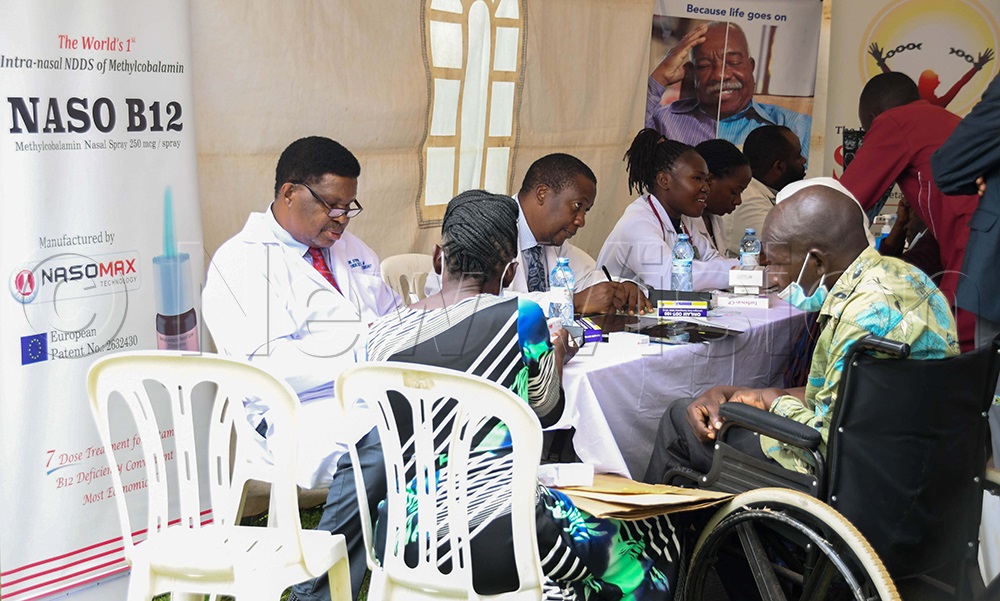'Lifestyle-related diseases fuelling rising stroke cases'
Dr Stephen Matovu, a senior consultant physician in the Neurology Unit at Mulago Hospital, says hypertension remains the biggest risk factor for stroke, followed by diabetes and high cholesterol.
Patients suffering from stroke getting health tips from a health worker at Mulago National Referral Hospital during the commemoration of World Stroke Day. (Photo by Violet Nabatanzi)
__________________
Health experts at Mulago National Referral Hospital have warned that lifestyle-related diseases such as high blood pressure, diabetes, and high cholesterol are driving a surge in stroke cases across the country.
Dr Stephen Matovu, a senior consultant physician in the Neurology Unit at Mulago Hospital, says hypertension remains the biggest risk factor for stroke, followed by diabetes and high cholesterol.
“It’s obvious that not everyone who gets a stroke has high blood pressure, but hypertension remains the biggest risk,” Matovu says. Other factors include smoking, excessive alcohol consumption, obesity and lack of exercise.
He emphasises that most of these causes are lifestyle-related and can be controlled through regular screening and behavioural change.
Doctors of Mulago National Referral Hospital treating patients suffering from Stroke during the commemoration of World Stroke Day. (Photo by Jackie Nabatanzi)
Speaking during a medical camp at Mulago Hospital to mark World Stroke Day on October 29, 2025, Matovu revealed that stroke has become one of the most common causes of disability among Ugandans.
“Stroke is probably the most common condition that causes disability among patients".
A stroke occurs when blood flow to a part of the brain is interrupted, causing brain cells to die from a lack of oxygen and nutrients. This happens either because a blood vessel is blocked by a clot (ischemic stroke) or because a blood vessel bursts (haemorrhagic stroke).
In 2014, the health ministry carried out the National NCD risk factor survey and found that one in four adults had high blood pressure, 1.4% had diabetes, 14.5% were overweight, 4.6% obese, 12% people were using tobacco, and 28.5% were consuming alcohol.
Dr Gavin Mbabazi said many stroke patients have underlying hypertension that is either poorly managed or undiagnosed.
“We have many people who live with hypertension unknowingly, or they are not taking medication as prescribed. Unfortunately, some only discover they have high blood pressure after suffering a stroke,” Mbabazi said.
“Most people in Uganda are no longer physically active. That’s why we are seeing many people getting strokes,” he noted.
Preventive measures
Mbabazi advised Ugandans to take preventive health seriously by regularly checking their blood pressure, sugar, and cholesterol levels, taking prescribed medication consistently, exercising regularly and eating healthier diets rich in fruits and vegetables. He urged people to cut down on fatty foods, alcohol, and smoking.
Hospital executive director, Dr Rosemary Byanyima, said stroke is not only medically devastating but also financially draining for patients, families and the Government.
“When patients survive stroke, many are left with severe disabilities. Their care becomes a heavy burden on families and on the health system,” she said.
She added that when the stroke patients have just developed the episode, which usually has a sudden onset, they need ICU care; however, the ICU is often full, and even when they are admitted, their stay tends to be longer because they have to provide life support, stabilise the patient, transfer them to the ward and then admit another one.
She called for increased public awareness and early screening, stressing that prevention is more cost-effective than treatment.
“If you are diagnosed with diabetes or hypertension, take your medication as advised. Prevention is far cheaper than managing stroke, which strains both families and the national health system"